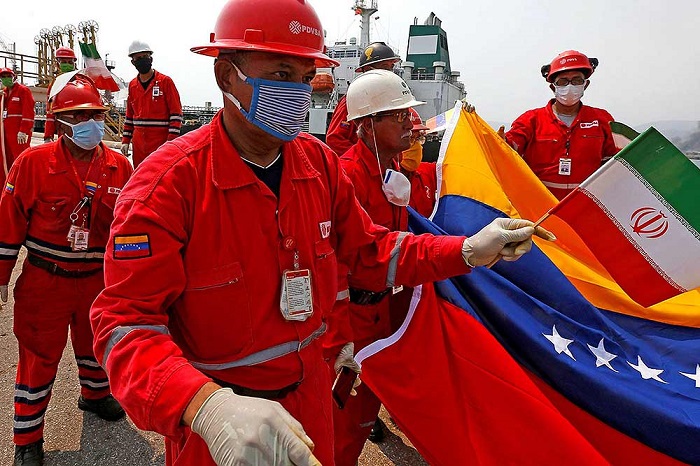
The Trump administration said it will exit a global anti-corruption effort that compels oil, gas and mining companies to disclose the payments they give governments worldwide.
 “The U.S. government remains committed to fighting corruption in the extractive industries sector and the ideals of transparency enshrined in the EITI principles,” Gregory Gould, the director of the Interior Department’s natural resources revenue office, wrote in the letter. However, “domestic implementation of EITI does not fully account for the U.S. legal framework.”
“The U.S. government remains committed to fighting corruption in the extractive industries sector and the ideals of transparency enshrined in the EITI principles,” Gregory Gould, the director of the Interior Department’s natural resources revenue office, wrote in the letter. However, “domestic implementation of EITI does not fully account for the U.S. legal framework.”“So you literally have American companies that are less transparent than Russian and Chinese state-owned enterprises,” she said. The pullback puts the U.S. in line with Equatorial Guinea and Azerbaijan — two other countries that are not fully participating in the voluntary, global initiative.
The initiative was launched in 2002 by then-UK Prime Minister Tony Blair with the goal of combating the so-called “resource curse” — a phenomenon in which countries’ oil and mineral resources have enriched a few and not led to broader prosperity. The idea was simple: If more is known about the money mining companies pay to governments, it can discourage graft by making officials accountable for explaining how it was spent. The effort was embraced by the Obama administration.
In February, amid oil industry pressure, Trump signed a congressional resolution repealing a Securities and Exchange Commission rule that required oil, gas and mining companies publish the payments they make to governments. That rule, mandated under the Dodd-Frank law, was seen as critical to compelling disclosure and satisfying the EITI requirements.
Tax Payments
The U.S. decision to withdraw as an EITI implementing country “is a disappointing, backwards step,” Fredrik Reinfeldt, the initiative’s chair, said in an emailed statement. Reinfeldt pointed to the disapproval of the Dodd-Frank payment disclosure rule as “a setback undermining the EITI’s efforts.”
Some U.S. energy companies also had dragged their feet on revealing more about their tax returns. Foreign-based companies such as Royal Dutch Shell Plc, Statoil ASA, Total SA and BP Plc disclosed their tax payments, as required under the laws of their home countries.
But at least three big U.S.-based oil companies didn’t disclose their tax payments: Chevron, ConocoPhillips and Exxon.
Chevron spokeswoman Melissa Ritchie said the company has been committed to the U.S. effort since its inception. “Chevron spent a significant amount of time preparing and reconciling USEITI report data,” she said, “but not payments to the IRS, given the confidential nature of IRS data.”
A representative for Exxon Mobil pointed to a January opinion piece describing the company’s support for the initiative everywhere it operates.
“Exxon and Chevron’s preference for secrecy” is what “made it impossible for the U.S. to comply,” said Corinna Gilfillan, head of the U.S. office at Global Witness, a group focused on curbing environmental and human rights abuses tied to oil and mineral extraction.
American Petroleum Institute spokesman Eric Wohlschlegel said the industry will continue working with the Interior department in reporting revenues and disbursements and with the State Department to drive global transparency.
“We’re still supportive of EITI, as we have been, and we’re going to continue to support our member companies and the U.S. government’s participation at the internationally,” he said.
Exxon, Chevron and API all have members on the broad stakeholder group guiding the U.S. effort.
The State Department, led by former Exxon CEO Rex Tillerson, will now be in charge of the U.S. commitment to the EITI as a “supporting country,” Interior’s Gould wrote.
Nothing in U.S. law precludes oil, gas or mining companies from voluntarily disclosing their tax or royalty payments, and some foreign subsidiaries of U.S. energy companies are already doing that.
“In reality, the refusal of all but a handful of the involved companies to disclose tax payments — not U.S. law — rendered the U.S. unable to meet the basic level of transparency required,” Morgan said.
The Interior Department said it would continue to maintain a web portal for disclosing government revenues by company and commodity will remain up and operational.
Veronika Shime, who represented the National Mining Association on the stakeholder group guiding the U.S. effort, called that disclosure website critical and said she was pleased it would continue.
Shime said she couldn’t explain the U.S. retreat but suspected that the overall cost of the program and a dispiriting lack of attention to it may have been factors. Given already strong anti-corruption measures built into U.S. law and regulations, the government may have felt it was unnecessary and expensive, Shime said.
By Jennifer A Dlouhy


















